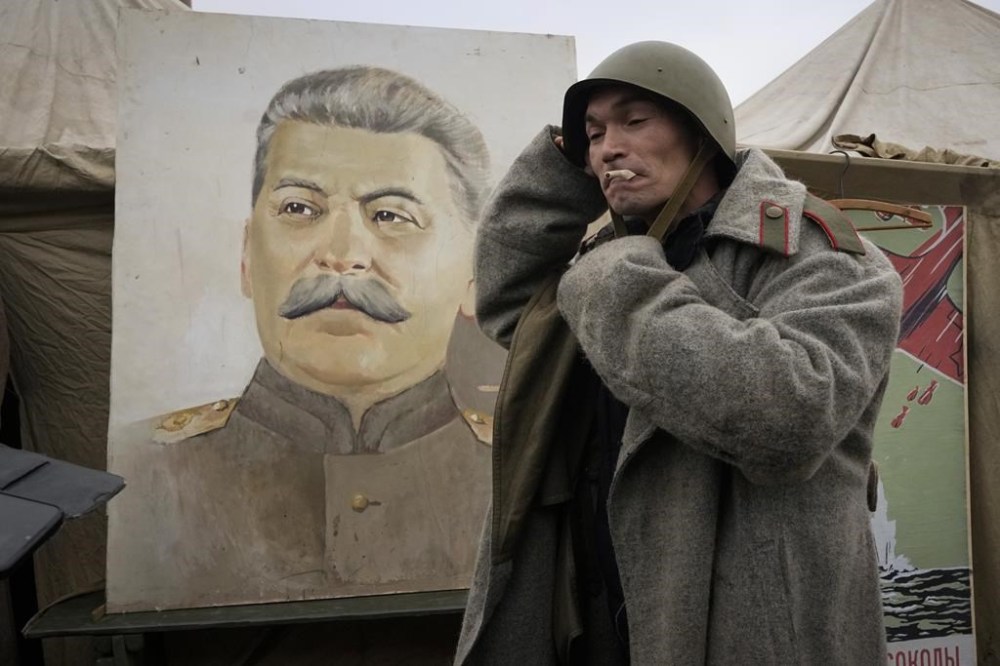Russia marks 80 years since breaking the Nazi siege of Leningrad
Advertisement
Read this article for free:
or
Already have an account? Log in here »
To continue reading, please subscribe:
Monthly Digital Subscription
$0 for the first 4 weeks*
- Enjoy unlimited reading on winnipegfreepress.com
- Read the E-Edition, our digital replica newspaper
- Access News Break, our award-winning app
- Play interactive puzzles
*No charge for 4 weeks then price increases to the regular rate of $19.00 plus GST every four weeks. Offer available to new and qualified returning subscribers only. Cancel any time.
Monthly Digital Subscription
$4.75/week*
- Enjoy unlimited reading on winnipegfreepress.com
- Read the E-Edition, our digital replica newspaper
- Access News Break, our award-winning app
- Play interactive puzzles
*Billed as $19 plus GST every four weeks. Cancel any time.
To continue reading, please subscribe:
Add Free Press access to your Brandon Sun subscription for only an additional
$1 for the first 4 weeks*
*Your next subscription payment will increase by $1.00 and you will be charged $16.99 plus GST for four weeks. After four weeks, your payment will increase to $23.99 plus GST every four weeks.
Read unlimited articles for free today:
or
Already have an account? Log in here »
Hey there, time traveller!
This article was published 27/01/2024 (648 days ago), so information in it may no longer be current.
ST. PETERSBURG, Russia (AP) — The Russian city of St. Petersburg on Saturday marked the 80th anniversary of the end of a devastating World War II siege by Nazi forces with a series of memorial events attended by Russian President Vladimir Putin and close allies.
The Kremlin leader laid flowers at a monument to fallen Soviet defenders of the city, then called Leningrad, on the banks of the Neva River, and then at Piskarevskoye Cemetery, where hundreds of thousands of siege victims are buried.
On Saturday afternoon, Putin was joined by Belarusian President Alexander Lukashenko in Gatchina, a town outside St. Petersburg that once housed camps for Soviet prisoners of war, for the unveiling of a statue commemorating civilians killed during the Nazi onslaught.

The Red Army broke the nearly two-and-a-half year blockade on Jan. 19, 1943, after fierce fighting. Estimates of the death toll vary, but historians agree that more than 1 million Leningrad residents perished from hunger, or air and artillery bombardments, during the siege.
Putin was born and raised in Leningrad, and his World War II veteran father suffered wounds while fighting for the city.
Blockade survivor Irina Zimneva, 85, told The Associated Press that she’s still haunted by memories of the tiny food rations distributed to residents during the deadly winter of 1941-1942. Each of her family members received 125 grams of bread a day, and Zimneva’s mother pleaded with her to be patient as she begged for more.
Zimneva said that her mother’s love helped her through those dark days.
“I don’t know what other way (I would have survived),” she told the AP.
When Nazi soldiers encircled Leningrad on Sept. 8, 1941, Zimneva had more than 40 relatives in the city, she said. Only 13 of them lived to see the breaking of the siege.
Before the anniversary commemorations, an open-air exhibition was set up in central St. Petersburg to remind residents of some of most harrowing moments in the city’s history.
The Street of Life display shows a typical blockade-era apartment, with a stove in the center of a room, windows covered by blankets to save heat and the leftovers of furniture used for kindling. Visitors can also look inside a classroom from that time, and see replicas of trams and ambulances from the early 1940s.
For older residents, these are poignant reminders of a time when normal life had been suspended, with heavy bombardment largely destroying the city’s public transit network, while death and disease spread through its streets.
“If you touch the history, you feel that pain and horror that were happening here 80 years ago. How did people manage to survive? It’s mind-boggling,” Yelena Domanova, a visitor to the exhibition, told the AP.
World War II, in which the Soviet Union lost an estimated 27 million people, is a linchpin of Russia’s national identity. In today’s Russia, officials bristle at any questioning of the USSR’s role, particularly in the later stages of the war and its aftermath, when the Red Army took control of vast swathes of Eastern and Central Europe.
Moscow has also repeatedly sought to make a link between Nazism and Ukraine, particularly those who have led the country since a pro-Russia leadership was toppled in 2014. The Kremlin cited the need to “de-Nazify” its southern neighbor as a justification for sending in troops in February 2022, even though Ukraine has a democratically elected Jewish president who lost relatives in the Holocaust.

